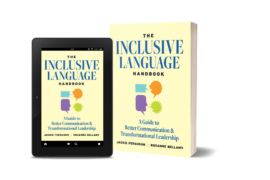As more people begin to talk about and reflect upon issues of racism, sexism, and other forms of discrimination, there’s one question that almost always pops up along the journey: “What can I do?” There are always opportunities for allyship, whether you’re using your voice, sphere of influence, or platform. We all have the power to make a difference. But first, let’s explore the term “ally,” and what it means to be one.
What is an ally?
An ally is someone who has privilege, but chooses to stand for and with marginalized communities by taking tangible, ongoing actions to dismantle systems of oppression. To become an ally, you must work to develop empathy toward another group’s challenges, finding ways to help carry the burden as your own.
Who can become an ally?
Anyone and everyone has the potential to be an ally! The key thing to understand about allies is that, although they are not members of the marginalized group(s) they support, they make a conscious effort to understand their struggle and use their own privilege to speak out. Being an ally is hard work, and you can’t become one overnight—but remember, mistakes are expected, and they shouldn’t discourage you from trying. Keep working to develop your perspective and take an active role in fighting for what’s right.
What tangible steps can you take to get started?
First: listen, listen, listen. For allies who aren’t sure where to start, listening to the voices of those who are often silenced is among the most meaningful actions you can take. The best way to learn, understand, and develop empathy is to listen.
Next, educate yourself. Remember, it’s not your nonbinary coworker’s job to give you a lesson on gender identity, for example. Search for books, documentaries, and news features that can teach you something you didn’t know. This will empower you to have important conversations with other people, too, creating opportunities for meaningful connection and action.
Also, speak up! Become a vocal ally to marginalized groups on social media platforms and in public spaces, such as peaceful protests and demonstrations. Make your voice heard at the voting poll, locally and nationally. Call and write your legislators about pressing issues that affect marginalized groups.
Last but not least, use your privilege to give back, whether it’s donating to an organization that aligns with your advocacy or mentoring someone in an underserved community. Use your privilege to expand access to those who need it most. Gather a group of friends, family, and/or colleagues to join you in volunteering efforts. The more you can encourage others to follow your example, the more you can impact your local community.
Below is a list of resources that can help you get started on becoming an ally. This list is not comprehensive or exhaustive, but it provides a great starting point for tapping into other perspectives.
Articles
- 5 Terms You Should Learn to Become a Better Ally
- Four Simple But High-Impact Strategies For Being A Better Ally For Women In The Workplace
- How to Be a Trans Ally: Show Us We Can Trust You
- Amplifying Their Voice by Lowering Ours: What it Means to be a Disability Ally
Books
- Beyond Diversity: 12 Non-Obvious Ways To Build A More Inclusive World
- Invisible Women: Data Bias in a World Designed for Men
- So You Want to Talk About Race
- The Gay Revolution: The Story of the Struggle
Movies
- Minari
- Crip Camp: A Disability Revolution
- The Death and Life of Marsha P. Johnson
- Judas and the Black Messiah
Podcasts
Whether you’re looking to facilitate important conversations in the workplace, or find ways to serve as an organization, we can help. Contact us at info@thediversitymovement.com to learn more.






